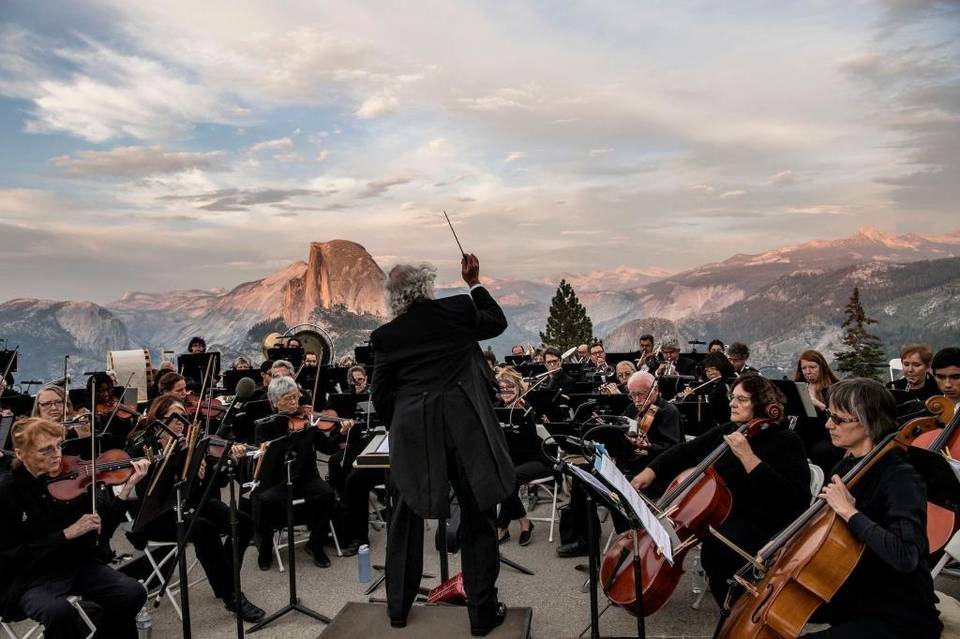In moments of musical beauty, anger melts, hatred dissolves, peace dawns
Fresno Bee, August 27, 2016
WITHOUT HOPEFUL SPLASHES OF JOY, LIFE WOULD BE DULL AND MEANINGLESS.
Last Sunday, the Mariposa Symphony Orchestra performed at Glacier Point in Yosemite National Park. Perched on the edge of a cliff, the orchestra played original pieces composed in honor of Yosemite and the centennial of the National Park Service.
As Half Dome blushed in the setting sun, Yosemite’s granite gorges resounded with song. At dusk, a bat danced above the bassoons. After the last echo faded, a shooting star flashed into view. It quickly vanished into darkness.
 Beauty is fleeting. It shines and echoes for a moment. Then it is gone. Youthful brilliance becomes old age. Summer sun gives way to winter winds. Music always returns into silence.
Beauty is fleeting. It shines and echoes for a moment. Then it is gone. Youthful brilliance becomes old age. Summer sun gives way to winter winds. Music always returns into silence.
The fragility of beauty is a reminder of mortality. But beauty also soothes and reassures. Wonder and joy arouse our better angels. Natural splendor and human art make life worth living.
The concert at Glacier Point honored the 100th anniversary of the National Park Service, whose work conserves the wild wonders of our continent. Some Park Service employees also play in the Mariposa orchestra. How cool for those rangers to serenade the park they love.
The arts and Yosemite
One might think it odd to stage a symphony at Glacier Point. But according to Yosemite spokesman Scott Gediman, “From the signing of the Yosemite Grant to the present day, the arts have played a significant role in the creation and continued interest in preserving these public places.”
Yosemite sparkles in Ansel Adams’ photos. It is illuminated by John Muir’s prose. Yosemite has a new artistic champion in Les Marsden, the conductor of the Mariposa orchestra.
Marsden composed a complex cycle of four pieces to honor Yosemite and the Park Service. Marsden’s compositions are classically American, reminiscent of Aaron Copland. The music told the history of the national parks. It imitated wind, water, fire and animal life.
As Marsden’s dynamic baton came to rest and the music faded into silence, you could hear crickets chirping and birds singing. I was struck by the thought that human art is a response to nature’s call. The human imagination swells in the presence of Half Dome. Birdsong tickles our ears. Thunder quickens the heart. And Yosemite Falls provokes laughter and shouts.
WITHOUT HOPEFUL SPLASHES OF JOY, LIFE WOULD BE DULL AND MEANINGLESS.
Poetry, painting and music reflect the wonders of the world. Human art transcends matter. Without the soaring responsiveness of the human spirit the earth would be quiet and dull.
John Muir said, “Everybody needs beauty as well as bread, places to play in and pray in, where nature may heal and give strength to body and soul alike.” Muir explained that gardens and parks satisfy our “natural beauty-hunger.” We plant flowers, tend our gardens, and visit parks looking for inspiration and consolation.
Muir claimed that natural beauty comforts “nerve-shaken, over-civilized people.” For Muir, mountain parks are “fountains of life.” Their sublime wonder stirs the spirit.
Fountains of life
Art and music are also fountains of life. The arts encourage us to savor the world.
One of my colleagues, Thomas Loewenheim, the conductor of the Fresno State SymphonyOrchestra, has confessed his hope that music provides a path toward peace. I think he is right. Music, beauty, art and nature encourage us to transcend our petty differences. They lift us beyond ourselves and bring us together in awe, reverence and delight.
Stand on Glacier Point. Immerse yourself in poetry. Fill your lungs with song. Dig your fingers into the soil. Smell the wonder of flowers. Or simply listen to the birds. The aesthetic mood encourages us to breathe more deeply – to listen, see and feel.
In moments of beauty, anger melts, hatred dissolves and peace dawns. Winter storms will come to the high country. Fires will burn the hills. And madmen rage in the lowlands. But peace is found in beauty. And hope is found in the fragments of color, song, granite and water that we carry in our hearts.
Without hopeful splashes of joy, life would be dull and meaningless. Hallelujah for Yosemite. Hurray for Marsden and the Mariposa symphony.
And thank goodness for the men and women of the Park Service, whose work has preserved nature’s wonders for 100 years. Here’s hoping that the artists, rangers and natural wonders of our world will continue to inspire and console for another century.



